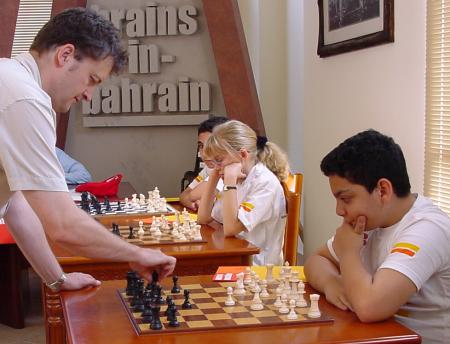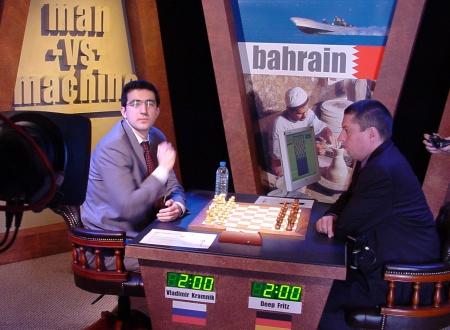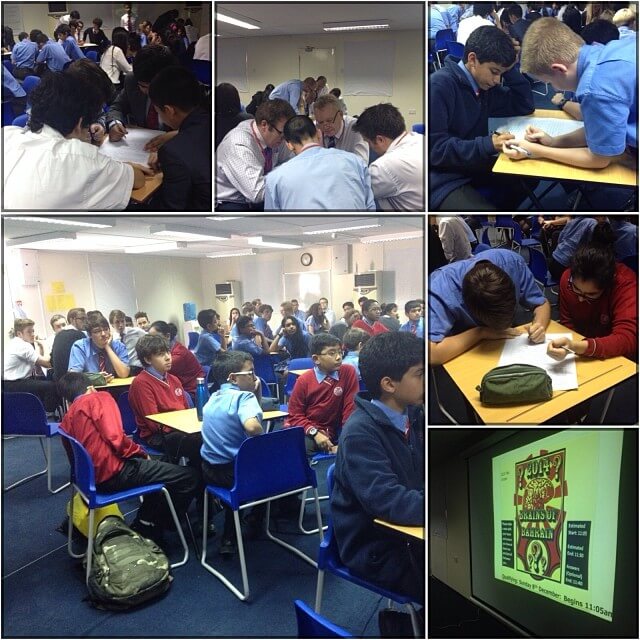Brains in Bahrain
Brains in Bahrain was a chess match in eight games between the then reigning world chess champion Vladimir Kramnik and the chess program Deep Fritz. He was held from October 4 to 15, 2002 in Manama place and ended in a draw 4:4.
Prehistory
Garry Kasparov lost 1997 medially much-publicized contest against the mainframe computer Deep Blue. There was no rematch. The question therefore arises as to whether this was just a coincidence or was already the end of human superiority in chess set. Since the computing speed of personal computers had increased steadily since then, a contest against a PC program has been proposed. In April 2001, a contest between two of the strongest computer programs took place in Cadaqués, the Deep Fritz with 14:12 won against Deep Junior for themselves. As an opponent Vladimir Kramnik was determined that Kasparov had taken the title in the World Chess Championship 2000. Hamad bin Isa Al Khalifa praised a prize of 1 million dollars for a win from Kramnik. Event of a tie he should $ 800,000, still get $ 600,000 for a loss. The race was already scheduled for October 2001, but was postponed due to the terrorist attacks on 11 September 2001 for one year.
Counterparty
Kramnik had at that time an Elo rating of 2807 and was behind Kasparov, the world No. 2 ranking. As a solid position players good prospects that it has been granted against a computer program. He prepared himself among others, along with the German Grandmaster Christopher Lutz prior to the competition. He had been contractually established that it has a copy of the program, which could not be changed, had to be handed over for training six months before. To eliminate disadvantages due to fatigue, there was a rest day after each game. In addition, Kramnik was, after 60 trains can apply for a cliffhanger, but what it did not come as no game lasted so long.
Deep Fritz was performed at this time recognized by the International Computer Chess Association rankings with an Elo rating of 2763. The program took advantage of eight Intel Pentium III, which were clocked at 900 MHz, respectively, and was thus able to evaluate a total of about 3 million positions per second.
Match History
After an uneventful draw in the first game Kramnik won the second and third game. In both cases, Kramnik could soon replace the ladies and play its final strength. After another draw in the fourth game Kramnik led at halftime 3-1. The fifth game, Kramnik lost unnecessarily by he overlooked a single-pass loss figure. In the sixth game he played against his match strategy on uncompromising attack, sacrificing a piece. Once Deep Fritz defended well and came in advantage Kramnik gave up the game after the 34th train. Analysts noted afterwards that the date at this time for it was by no means hopeless, and he gave up too early. So the match was balanced again. In the last two games, Kramnik did not perform any more risks and made two draws to the final score of 4:4.
Follow
After the competition, has been reported in the world media about, it was clear that commercial chess programs are roughly equivalent to the world's best players. This was confirmed in early 2003, when Garry Kasparov played a draw in a match against Deep Junior in New York City 3:3. The end of 2006 Kramnik in Bonn came again against Deep Fritz, and lost against an improved version that could calculate on Intel Core 2 about 10 million positions per second, 4-2.










